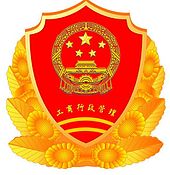New guidelines from the State Administration for Industry and Commerce forbids the registration of business names that are too long, “too weird,” politically sensitive, overtly religious, or discriminatory. At Sixth Tone, Savannah Billman reports on the new rules, which were published by the ministry early this month and went into effect last weekend:
The new rules will curb outlandish company names, according to a report by Legal Daily that referenced the famous example of a condom company from northern China. Called “Uncle Niu” for short, its full name is “There Is a Group of Young People With Dreams, Who Believe They Can Make the Wonders of Life Under the Leadership of Uncle Niu Internet Technology Co. Ltd.” The 39-character name went viral in June on microblog platform Weibo.
But such names will no longer pass. One section of the 33 guidelines prohibits long-winded names such as Uncle Niu’s by insisting that all company names be comprised of just a few words rather than sentences, paragraphs, or full literary narratives.
Further rules prohibit language that discriminates against genders, races, or ethnicities; overtly religious terms related to Christianity or Islam; and words associated with politically sensitive subjects such as national law, the People’s Liberation Army, or the banned Falun Gong spiritual movement. References to dissident groups or terrorism — such as the term “9/11” — are forbidden, as are companies claiming to be “national” or “the best.” Finally, the rules aim to cut down on copycats by banning duplicate registrations. […] [Source]
At The New York Times, Ailin Tang notes that the rules also give the ministry authority to “fix” the names of already registered businesses, and relays comments from condom maker Uncle Niu and other businesspeople who may see their company names in the crosshairs:
The rules say new companies cannot register names that are paragraphs or long sentences, or that include sensitive language, including political terms. It also gives the government vague authority to fix “inappropriate” names as it sees fit. But Niu Xiaolu, a.k.a. Uncle Niu, is not concerned.
“If I receive notice to shorten the name, I will try to keep it,” said Mr. Niu, whose company in Shaanxi makes condoms. “If I cannot, I will fix it according to regulations.”
[…] Yang Wen, the head of What Are You Looking At Shenzhen Technology Company, said he did not think his business would run into trouble, despite having a sentence — albeit an unpunctuated one — in its name. The company makes virtual reality hardware.
“‘What are you looking at?’ is a casual northern China phrase,” Mr. Yang said. “It does not have any problem. This name is easy to remember and fits with our V.R. glasses products.”
[…] For Mr. Niu, having a long company name cuts both ways. On the one hand, he said, it made payment using WeChat and Alipay impossible — neither system can handle a name of that size. [Source]
At the BBC, Tim McDonald notes that since the guidelines were publicized, Chinese web-users have been scouring the internet to find the strangest business names in China—some of which have themselves been inspired by netizen-created memes. McDonald also notes the difficulty of judging the strangeness of a company name from an English translation, and describes the industry that exists in China for helping multinational companies deal with this issue when entering the China market.
“Shenyang Prehistoric Powers Hotel Management Limited Company” might sound weird but less so to Chinese sports fans who remember swimmer Fu Yuanhui.
She famously won a bronze medal at the Rio Olympics, afterwards declaring: “I have used all my prehistoric powers to swim!”
[…] There are also lots of restaurants and cafes with the phrase “skinny blue mushroom”.
The phrase originated from a meme which mocked a man from Guangxi province who uploaded a video of himself talking about his loneliness while his girlfriend was away.
“Unbearable, I want to cry,” he moaned – but thanks to his accent, it ended up sounding more like “skinny blue mushroom”. [Source]
For more of the strangest company names uncovered by netizens since the release of the guidelines, see a list compiled by Fast Company.








